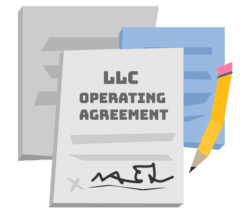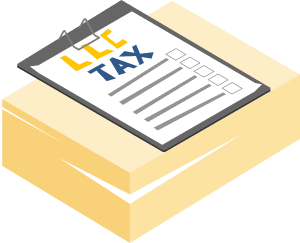How to Start an LLC in Pennsylvania
Pennsylvania LLCs offer business owners strong liability protection in an easy-to-manage business structure. Pennsylvania charges $125 to form an LLC, but compared to other states, maintenance fees are low—you’ll only need to pay $7 a year to keep your LLC active.
To register your LLC, you’ll file a Pennsylvania Certificate of Organization and a Docketing Statement with the state Bureau of Corporations and Charitable Organizations. You can file this paperwork on your own, or hire someone (like Northwest) to do it for you. You’ll also need to take a number of other steps to meet federal government requirements for your new business and safeguard your privacy and liability protection. Here’s how it’s done.

1. Name Your LLC
The first thing you need to do is choose a business name. You might already have an idea for what you want to call your company, but you’ll need to make sure it’s valid under state statute and available for your use.
Pennsylvania naming rules can be found in 15 PA Cons Stat § 202-204, but to sum up, your LLC must:
- Include “limited liability company,” “limited,” or “company” or an abbreviation for those words (like “LLC.”)
- Not imply the business is something it’s not, like a bank or government agency.
- Be one-of-a-kind! If your business name is already in use in Pennsylvania (or too similar to another name), your filing will be rejected, so check to see if your name is available with a Pennsylvania Department of State Business Search.
Tip: Even if your name is available in Pennsylvania, it might still be under federal trademark. That won’t prevent you from using the name, but may expose you to legal action in the future. A Trademark Clearance Search can save you a headache down the line.

2. Register Your Domain Name
Once you’ve decided on a business name available in Pennsylvania, make sure it’s available as a domain name. Domain names are the address of a website (for example, ours is northwestregisteredagent.com).
It’s OK if you’re not ready to start building a business website yet, but registering your domain name ahead of time is still smart, because:
- Changing a LLC name is hard. Before officially registering your LLC, making sure the name (or a suitable name related to it) is available for use as a domain name.
- Once you have your domain name, you can get a business email address. You’ll need to give out contact information once you start your business. A business email address with its own domain name (like [email protected]) looks professional, helps you organize your communications, and lets you keep your personal email address away strangers.
Tip: Hire us to start your LLC and get a free domain name for a year!

3. File a Pennsylvania LLC Certificate of Organization
When registering your business, you’ll submit Certificate of Organization and Docketing Statement forms to the Pennsylvania Bureau of Corporations and Charitable Organizations. Your LLC officially exists after the bureau approves those documents. When you file online, the Certificate of Organization and Docketing Statement are combined into one form. However, if you file by mail, you’ll need to fill out and submit two separate forms.
Again, the name must include some version of “LLC” or “Limited Liability Company,” and be unique in the state of Pennsylvania.
Tip: When filing online, you’ll be asked if you’ve optionally reserved a business name in advance, but if you’ve checked availability prior to filing, just click “no.”
A registered agent is a person or company that you designate to receive official mail on behalf of your LLC (Pennsylvania actually requires you to list a “registered office,” but the same basic requirements apply). Designating a registered office is legally required in Pennsylvania. If your LLC is served with a lawsuit, the registered office is where the paperwork will be delivered to your business. After your registered office accepts that document, your business is legally considered “served,” and the registered office should then promptly get that notice to you.
Legally, your Pennsylvania registered office must:
- Be a physical street address (not a PO box or virtual office) in the state.
- Be open at that address during regular business hours.
- Have someone present who can accept service of process on behalf of your business.
You’ll need to list your registered agent’s name and (if they’re not a commercial service like us) Pennsylvania street address.
Tip: You can operate your own registered office if you meet those requirements, but if you’d rather not be rooted to a single location all day long, or want to stay more private with your LLC, you can hire a professional (like us) to do that for you.
An organizer is just the person who signs and submits your Certificate of Organization, and doesn’t have to be a person in your LLC. But remember: your organizer’s information becomes public record. If you hire Northwest, we’ll be your organizer and list our information here.
This is where you decide if your LLC should become active immediately, or on a future date—like if you put off your effective date until the start of a new tax year. Most LLCs become active immediately.
If your LLC will provide certain state-licensed services (in the fields of medicine or law) listed on the form, you’ll need to indicate those services here. This will form your LLC as a professional limited liability company (PLLC) whose members must maintain those professional licenses.
Check the box if your LLC will be a benefit company (which provides a specific public benefit like education, but can also make a profit). Benefit companies have additional filing requirements.
You have the option to attach additional documents, such as member/manager information or government approval documents (if needed).
The Docketing Statement is included with the Certificate of Registration online. If you file by mail, it’s a separate form, but you’ll send in both documents at the same time. It asks you to provide a brief description of your LLC’s business activity, the name and address of whoever will file tax reports, a brief description of business activity, and your tax or fiscal year end date.
Tip: The Docketing Statement also asks for your FEIN (Employer Identification Number), but you can leave that blank, since you’ll probably only get your FEIN after your LLC is formed.
Listing this is optional, but the $125 filing fee is waived if you’re a veteran or active reservist.
How do you “file” a Pennsylvania Certificate of Organization?
“Filing” simply means getting your paperwork to the Pennsylvania Bureau of Corporations and Charitable Organizations with the correct filing fee ($125). The Bureau of Corporations no longer provides online forms to print and mail, so to file online, you must file online through the Pennsylvania Department of State’s online business filing portal.

4. Adopt an Operating Agreement
An operating agreement is document that determines how your LLC should operate. Any good operating agreement ought to cover rules for any important functions of your LLC, like member voting procedures, the allocation of profits, and how to resolve disputes.
Operating agreements are internal documents your LLC should keep on record. They may not be not be required by Pennsylvania law, but virtually any LLC benefits from having an operating agreement. Your LLC will need an operating agreement early on because banks usually need to see one before opening a new business bank account. And if disputes happen between LLC members in the future, an operating agreement that covers the issues in question might even spare you from legal trouble.
Tip: Writing an operating agreement isn’t easy, so our attorneys drafted an operating agreement specifically for use in Pennsylvania, and you can use it for free.

5. Get an EIN
Your LLC almost certainly needs an EIN (sometimes called a FEIN). An EIN is a nine-digit number that the IRS assigns your business for tax identification purposes, a lot like a Social Security Number. EINs are frequently required when opening a business bank account, applying for loans and licenses, and paying taxes—and if you don’t have one, you’ll have to use your SSN instead, so an EIN helps protect your personal identity, too. You can apply for one online with the IRS or hire us to handle it for you.

6. Get a Business Bank Account
Personal finances and business finances shouldn’t mix. When they do, it’s considered “piercing the corporate veil” (which sounds mysterious, but simply means a court has found you and your LLC aren’t separate entities like they should be). This is why you need a business bank account for your LLC, to help keep those finances separate. Most banks will want to see your LLC’s operating agreement, EIN, and an LLC Resolution to Start a Bank Account.

7. File State Reports & Taxes
Most states have some sort of annual or biennial reporting requirement. Pennsylvania used to be hands-off about business reporting, only requiring a decennial report (that’s one report every ten years). However, starting in 2025, LLCs must file a report with the Pennsylvania Department of State every year before October 1. It costs $7 to file and requires basic information about your LLC.
But if you miss that classic Pennsylvania “I haven’t had to worry about filing a business report in years” experience, hire us to file your Pennsylvania Annual Report for you.

8. File Your BOI Report
New LLCs are asked to file a Beneficial Ownership Information (BOI) Report within 90 days of formation. BOI Reports are a new federal filing aimed at combating financial crimes like money laundering and other scams.
Due to an injunction, the Beneficial Ownership Information Report requirement is currently under review and voluntary to file. At this time, filing a BOI Report is optional, but if the requirement is reinstated, the original deadline (January 1, 2025 for most businesses) and penalties may still apply.
We’ll keep our site up to date as the court rulings proceed, and help you stay in the loop about this important business filing.
*This is informational commentary, not advice. This information is intended strictly for informational purposes and does not constitute legal advice or a substitute for legal counsel. This information is not intended to create, nor does your receipt, viewing, or use of it constitute, an attorney-client relationship. More information is available in our Terms of Service.
Ready to Start an LLC in Pennsylvania?








